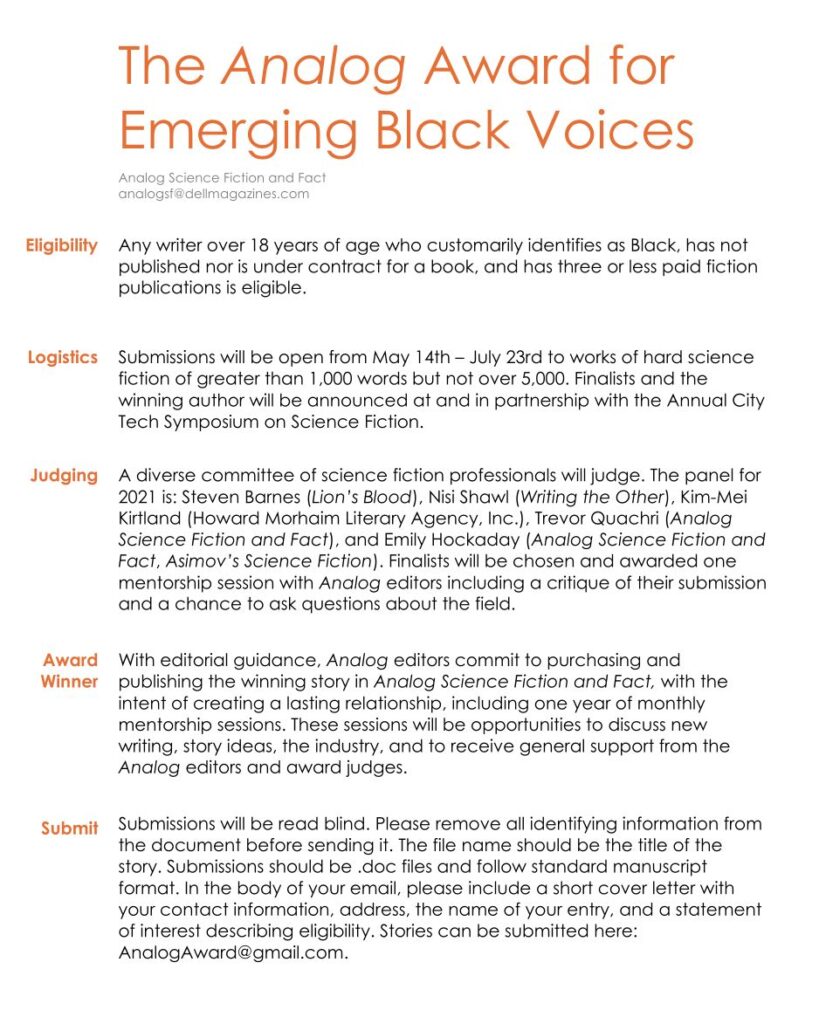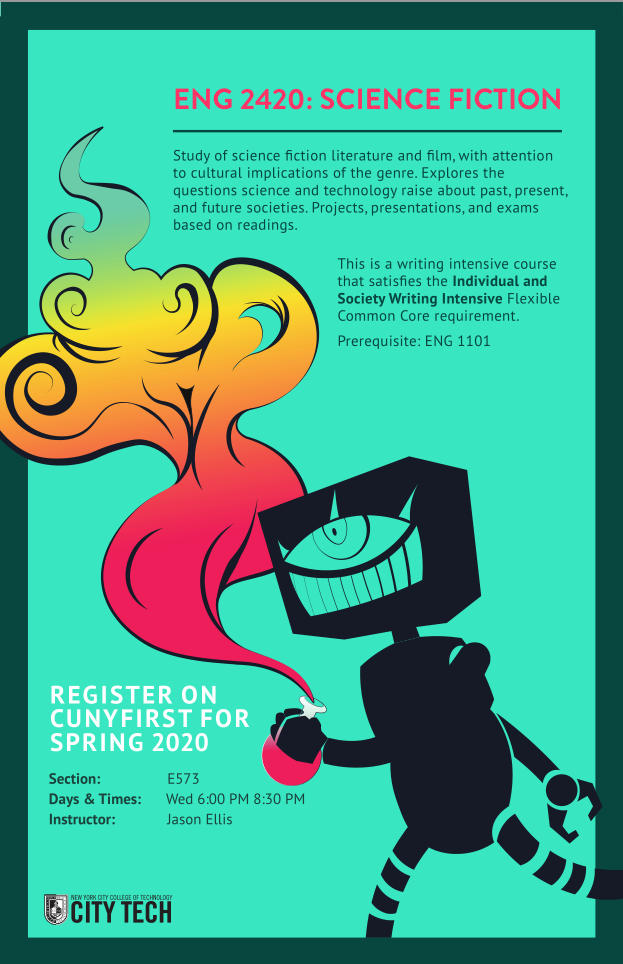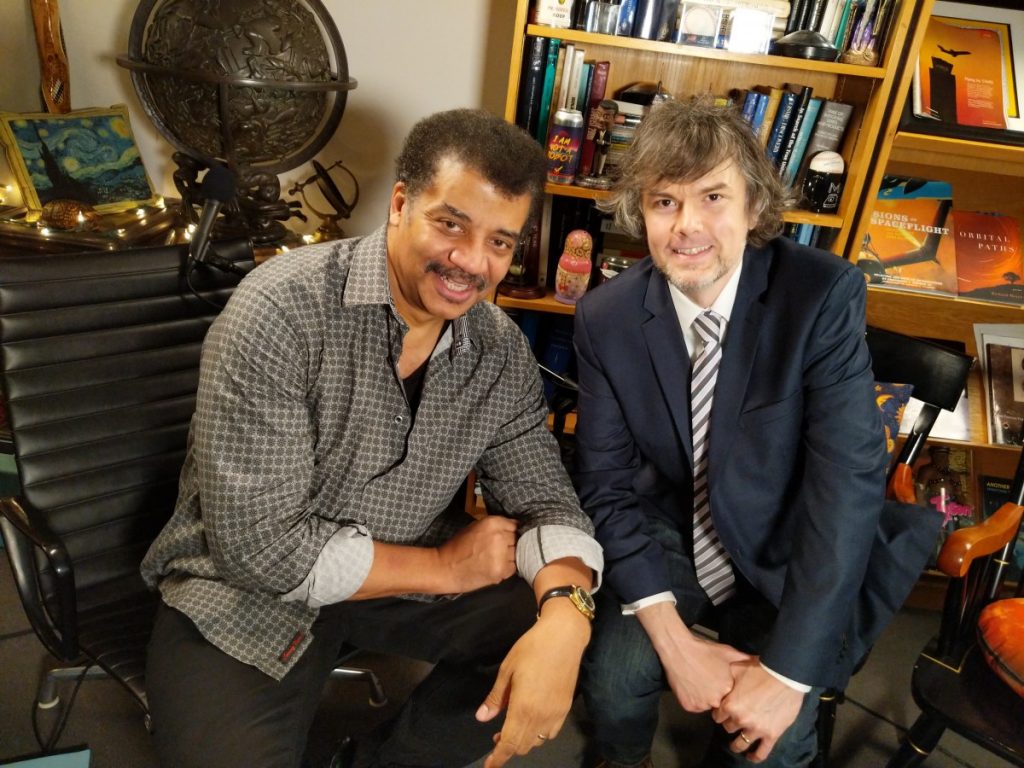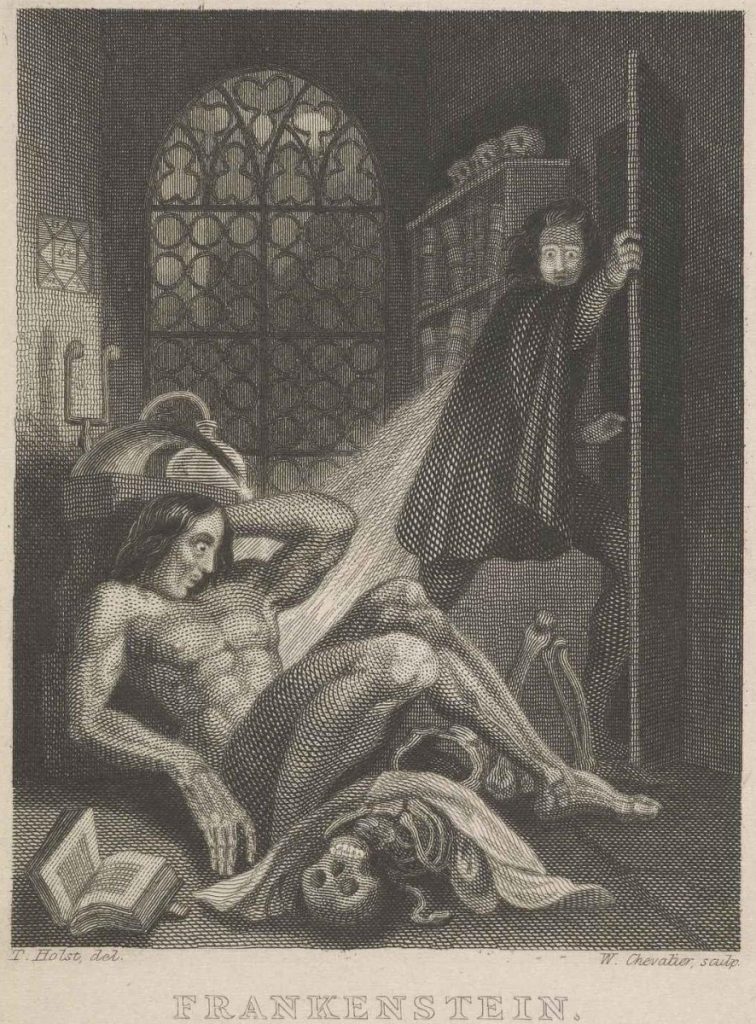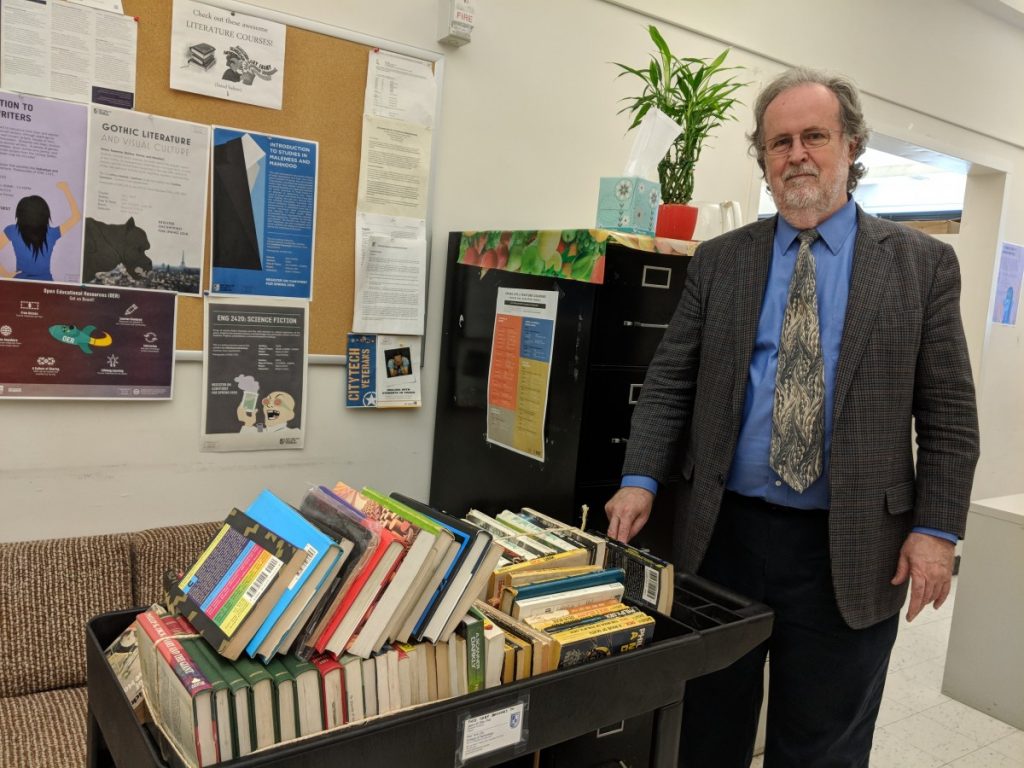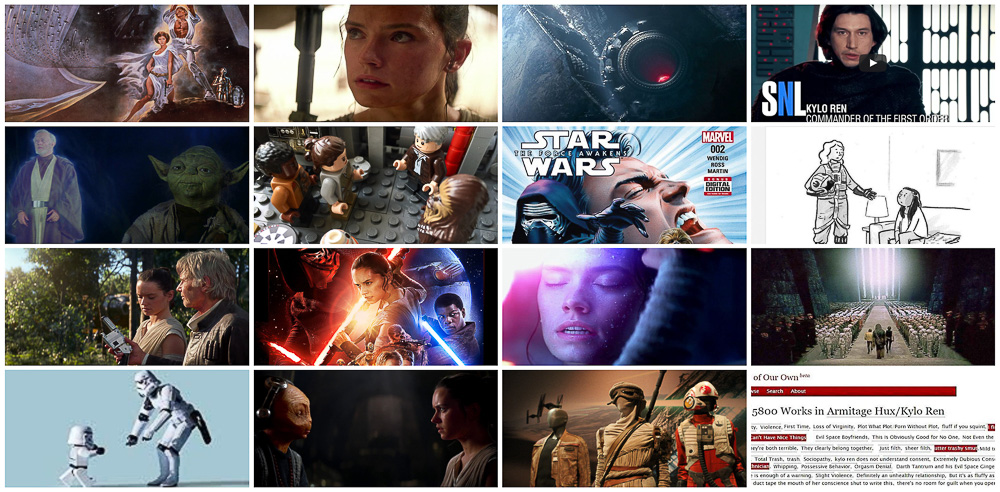If you’re planning to attend this year’s symposium–and we hope that you all are: students, faculty, scholars, and the public–please RSVP by filling out this very short form. This is helps us plan the best symposium possible for you!
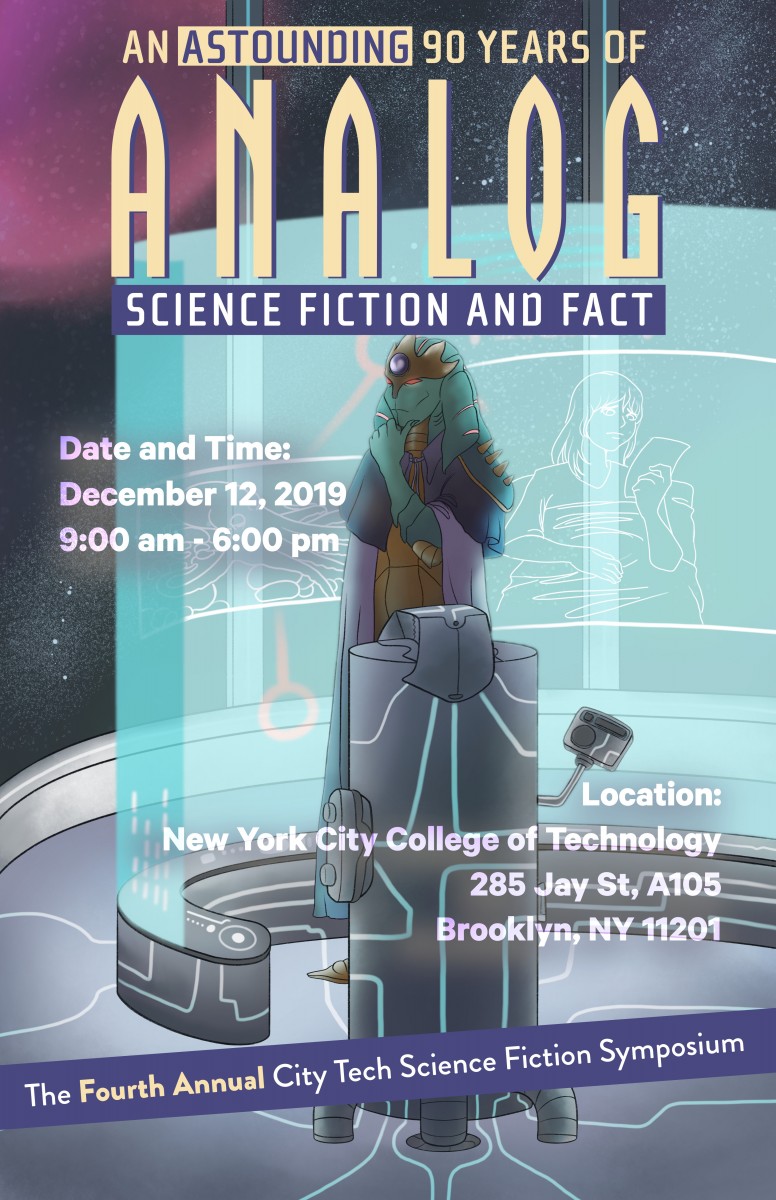
Fourth Annual City Tech Science Fiction Symposium Poster by Julie Bradford.
An Astounding 90 Years of Analog Science Fiction and Fact
The Fourth Annual City Tech Science Fiction Symposium
Thursday, Dec. 12, 2019, 9:00AM-6:00PM
New York City College of Technology, 285 Jay St., A105, Brooklyn, NY 11201
Organized by Jason W. Ellis (City Tech) and Emily Hockaday (Analog Science Fiction and Fact)
Held in partnership with Analog Science Fiction and Fact and its publisher Penny Publications.
Hosted by the School of Arts and Sciences at the New York City College of Technology, CUNY.
Event hashtags: #CityTechSF and #AnalogSF90th
Analog Science Fiction and Fact began its storied history 90 years ago as one of the most important and influential SF magazines with the publication of its first issue under the title Astounding Stories of Super-Science. During that time, its fabled editors, award-winning writers, recognized artists, and invested readers played roles in the development of one of the longest running and renowned SF magazines, which in turn, influenced the field and adapted to change.
The Fourth Annual City Tech Science Fiction Symposium celebrates “An Astounding 90 Years of Analog Science Fiction and Fact.” Bringing together SF writers, scholars, and fans, the conversations today will reflect on the past, comment on the present, and contemplate the future of Analog SF. Linked to these discussions is the role of SF in a college of technology that recognizes the importance of the genre through its Science Fiction class and support for the City Tech Science Fiction Collection, an archival holding of over 600-linear feet of magazines, anthologies, novels, and scholarship. Together, we will explore these connections.
Schedule
9:00am-9:20am
Breakfast and Opening Remarks
Justin Vazquez-Poritz, Dean of the School of Arts and Sciences, New York City College of Technology
Jason W. Ellis, Assistant Professor of English, New York City College of Technology
9:20am-10:00am
Teaching with SF Collections
Moderator: Lucas Kwong
Jason W. Ellis, “Introduction to the City Tech Science Fiction Collection”
Zachary Lloyd, “Interdisciplinary Approaches to Teaching with Science Fiction”
10:00am-10:10am
Break
10:10am-11:00am
Editors Panel
Moderator: Frank Wu
Panelists: Stanley Schmidt
Trevor Quachri
Emily Hockaday
11:00am-11:10am
Break
11:10am-12:40pm
Marginalized Voices and Feminist Futures
Moderator: Lisa Yaszek
Marleen Barr, “Rachel Rodman’s “The Evolutionary Alice” As Fractured Feminist Fantasy”
Adam McLain, “Visualizing Gendered Voice in Ninety Years of Astounding and Analog”
Marie Vibbert, “Visible Women in Astounding and Analog”
12:40pm-1:40pm
Lunch
1:40pm-3:10pm
Writers Panel
Moderator: Emily Hockaday
Panelists: Phoebe Barton
Leah Cypess
Jay Werkheiser
Alison Wilgus
Frank Wu
3:10pm-3:20pm
Break
3:20pm-4:50pm
Critical Issues in Analog SF
Moderator: Lavelle A. Porter
Sharon Packer, “Simian Cinema, Darwinian Debates, and Early Analog SF Stories”
Stanley Schmidt, “Humor in Analog”
Edward Wysocki, Jr., “Just the Facts: Articles in Campbell’s Astounding and Analog”
4:50pm-5:00pm
Break
5:00pm-6:00pm
Keynote Address by Mike Flynn
Introduction: Trevor Quachri
Symposium Participants
Symposium Participants
Marleen S. Barr is known for her pioneering work in feminist science fiction and teaches English at the City University of New York. She has won the Science Fiction Research Association Pilgrim Award for lifetime achievement in science fiction criticism. Barr is the author of Alien to Femininity: Speculative Fiction and Feminist Theory, Lost in Space: Probing Feminist Science Fiction and Beyond, Feminist Fabulation: Space/Postmodern Fiction, and Genre Fission: A New Discourse Practice for Cultural Studies. Barr has edited many anthologies and co-edited the science fiction issue of PMLA. She is the author of the novels Oy Pioneer! and Oy Feminist Planets: A Fake Memoir. Her latest publication is When Trump Changed, the first single authored short story collection about Trump.
Phoebe Barton is a queer trans science fiction writer. Her short fiction has appeared in venues such as Analog, On Spec, and anthologies from Bundoran Press and Alliteration Ink. She is currently writing the interactive fiction game The Tunnel Crew for Choice of Games.
She lives with a robot in the sky above Toronto and is represented by Kim-Mei Kirtland at Howard Morhaim Literary Agency. She serves as an Associate Editor at Escape Pod, and she is a 2019 graduate of the Clarion West Writers Workshop.
Julie Bradford designed the third and fourth City Tech Science Fiction Symposium poster and program cover. She is a BFA in Communication Design Management student at City Tech who has a strong background in illustration. When she is not distracted by cute and shiny things or busy drawing up comic adventures with her Pokemon Go buddies, she is focused on her schoolwork and catching up on her shows. While completing her BFA, she is working as a graphic design intern for City Tech’s Faculty Commons. See her in-progress work online here: https://www.instagram.com/_saltyjules/.
Leah Cypess sold her first story while in high school, then gave in to her mother’s importuning to be practical and studied biology and law. However, she is now a full-time writer with numerous published short stories, including two published in Analog this year. She is also the author of four young adult fantasy novels, including Mistwood and Death Sworn. Leah grew up in Brooklyn, NY, and has since lived in Boston and in the D.C. area. You can find out more about her writing and her other interests at her website, www.leahcypess.com, as well as on Facebook, Twitter, and Instagram.
Jason W. Ellis is an Assistant Professor of English at the New York City College of Technology, CUNY. He holds a Ph.D. in English from Kent State University, M.A. in Science Fiction Studies from the University of Liverpool, and B.S. in Science, Technology, and Culture from Georgia Tech. Most recently, he talked with Dr. Neil deGrasse Tyson about the relationship between SF and society on StarTalk Radio.
Michael F. Flynn debuted in Analog with “Slan Libh” (11/84) and has contributed regularly ever since. His stories have been nominated for the Hugo Award seven times, most recently for “The Journeyman: In the Stone House” and won the Theodore Sturgeon Award for “House of Dreams.” He won the first Robert A. Heinlein medal for his body of work. His twelve novels include the four-volume FIRESTAR series and the four-volume SPIRAL ARM series as well as the Hugo-nominated Eifelheim and the critically-acclaimed The Wreck of “The River of Stars”. His third collection, Captive Dreams, includes three Analog stories and three new stories written for the collection. He is currently working on The Journeyman, a picaresque novel, and The Shipwrecks of Time, set in the alien world of 1965 Milwaukee.
Emily Hockaday is the managing editor of Analog Science Fiction and Fact and Asimov’s Science Fiction Magazine. She coedited, with Jackie Sherbow, the horror anthology Terror at the Crossroads: Tales of Horror, Delusion, and the Unknown. She is author of five poetry chapbooks including Space on Earth, What We Love & Will Not Give Up, and the forthcoming Beach Vocabulary. Find out more about her at www.emilyhockaday.com or on twitter @E_Hockaday.
Lucas Kwong is an assistant professor of English at New York City College of Technology. His scholarship on fantastic fiction, religion, and colonialism has been published in Victorian Literature and Culture, Religion and Literature, and Journal of Narrative Theory. He also serves as the assistant editor for New American Notes Online, an online interdisciplinary scholarly journal, and as editor for City Tech Writer, a journal of student writing. He lives in Brooklyn with his wife.
Zachary Lloyd has completed an MA in philosophy from The New School for Social Research and is currently a PhD student in comparative literature at CUNY Graduate Center. He is an adjunct instructor in the English department at Brooklyn College.
Adam McLain is a Master of Theological Studies candidate at Harvard Divinity School. He studies the intersection of gender, sexuality, theology, and literature, with an emphasis on questions of identity and temporality. At Brigham Young University, his undergraduate, he served for three years as managing editor of the award-winning science fiction and fantasy magazine, Leading Edge, and he has presented papers at Life, the University, and Everything; International Conference for the Fantastic in the Arts; the International Congress on Medieval Studies; North American Science Fiction Association conference; the Society for Utopian Studies; and the Science Fiction Research Association conference.
Sharon Packer, M.D., is a Mount Sinai-affiliated psychiatrist who is in private practice in New York and is the author of many journal articles, books chapters, and several academic books, including Neuroscience in Science Fiction Film; Cinema’s Sinister Psychiatrists; Superheroes and Superegos: The Minds behind the Masks; Movies and the Modern Psyche; Dreams in Myth, Medicine and Movies. She edited Mental Illness in Popular Culture; Evil in American Popular Culture; and the forthcoming Welcome to Arkham Asylum.
Trevor Quachri, who took the reins of Analog Science Fiction and Fact as editor in 2012, started off as an editorial assistant in 1999 and worked his way up the ladder at Analog and Asimov’s Science Fiction, under Stanley Schmidt, Sheila Williams, and Gardner Dozois, respectively. On top of that, he’s also been a Broadway stagehand, collected data for museums, and executive produced a science fiction pilot for a basic cable channel. He lives in New Jersey with his fiancée, daughter, and way, way too many comic books.
Stanley Schmidt (PhD, Physics) was the editor of Analog for a long time (34 years!) and enjoys writing for it just as much now as he did before he became editor in 1978. His recent contributions include the serialized novel Night Ride and Sunrise (now available from FoxAcre Press), and stories, articles, and guest editorials of various shapes and sizes. A small selection of Dr. Schmidt’s many accolades and accomplishments include the Hugo Award for Best Editor: Short Form, the SFWA Solstice Award, and the Robert A. Heinlein Award given for outstanding published works in science fiction and technical writings that inspire the human exploration of space. When not reading Analog just for fun, Dr. Schmidt can be found hiking, traveling, and playing various sorts of music. Find more information about Stanley Schmidt on his website: https://sfwa.org/members/stanleyschmdit.
Justin Vazquez-Poritz is the Dean of the School of Arts and Sciences and Professor of Physics at the New York City College of Technology.
Marie Vibbert has had six stories in Analog Science Fiction, as well as selling stories to other top markets such as Fantasy and Science Fiction and Lightspeed. She is the lead programmer for digital libraries at Kelvin Smith Library at Case Western Reserve University. Her monograph on the headdresses of the fifteenth century in northern Europe has been cited on Wikipedia.
Jay Werkheiser teaches chemistry and physics. Pretty much all the time. His stories are sneaky devices to allow him to talk about science in a (sort of) socially acceptable way. Much to his surprise, the editors of Analog and various other magazines, e-zines, and anthologies have found a few of his stories worth publishing. Many of those story ideas came from nerdy discussions with his daughter or his students. He really should keep an updated blog and author page, but he mostly wastes his online time on Facebook, MeWe, or Twitter (@JayWerkheiser).
Alison Wilgus is a Brooklyn-based writer, editor and cartoonist who primarily works in comics, but her interest in short fiction lead her to attend both Clarion West and Launchpad, and her stories have appeared in venues such as Analog, Interzone, and Strange Horizons. In her spare time Alison and her co-host, Gina Gagliano, make “Graphic Novel TK,” a podcast about the nuts and bolts of graphic novel publishing. Alison’s latest work is Chronin, a duology of historical SF graphic novels, published by Tor books. You can find her on Twitter and Instagram as @aliwilgus.
Frank Wu is a transdimensional interspace being, living physically near Boston with his wife Brianna the Magnificent, but regularly projecting his mind across time and space to commune with dinosaurs, eurypterids, and numinous energy beings. Visualizations and written accounts of these journeys can be found in Analog, Amazing Stories, Realms of Fantasy, frankwu.com, and the radiation-hardened memory bunkers of planet Gorsplax.
Edward M. Wysocki, Jr. holds a Ph.D. in Electrical Engineering from Johns Hopkins University (1978). He is now retired after more than 30 years with Martin Marietta/Lockheed Martin. He is a Charter Member of The Heinlein Society and a member of the Science Fiction Research Association. He has published various short articles and notes in The Heinlein Journal and Science Fiction Studies; the book chapter, “The Creation of Heinlein’s ‘Solution Unsatisfactory’” In Practicing Science Fiction: Critical Essays on Writing, Reading and Teaching the Genre. Eds. Karen Hellekson et al. (2010); and three self-published books: The Great Heinlein Mystery: Science Fiction, Innovation and Naval Technology (2012), An ASTOUNDING War: Science Fiction and World War II (2015), and Out of This World Ideas: And the Inventions They Inspired (2018).
Lisa Yaszek is Professor of Science Fiction Studies in the School of Literature, Media, and Communication at Georgia Tech, where she researches and teaches science fiction as a global language crossing centuries, continents, and cultures. She is particularly interested in issues of gender, race, and science and technology in science fiction across media as well as the recovery of lost voices in science fiction history and the discovery of new voices from around the globe. Yaszek’s books include The Self-Wired: Technology and Subjectivity in Contemporary American Narrative (Routledge 2002/2014); Galactic Suburbia: Recovering Women’s Science Fiction (Ohio State, 2008); and Sisters of Tomorrow: The First Women of Science Fiction (Wesleyan 2016). Her ideas about science fiction as the premiere story form of modernity have been featured in The Washington Post, Food and Wine Magazine, and USA Today and on the AMC miniseries, James Cameron’s Story of Science Fiction. A past president of the Science Fiction Research Association, Yaszek currently serves as an editor for the Library of America and as a juror for the John W. Campbell and Eugie Foster Science Fiction Awards.

